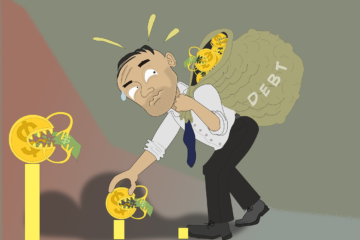We all love getting bonuses. Or any big windfall of money, really. Let me show you how I have advised former clients and friends on how to spend a big bonus in the past.
Account for Taxes
There is a common misconception about bonuses. Most people believe that they are taxed at a higher rate than your regular paycheck.
This is false.
Yes, you will probably have a higher percentage of taxes taken out than your regular paycheck. But that is only because the accounting software that writes your paycheck looks at your bonus check as if you were to make that every pay period.
When you file your taxes at the end of the year, your extra money you paid out of your check for your bonus will be a wash in your overall tax burden.
So if more tax money was taken out of your bonus check than usual, you will get some of that back when you file your taxes later.
With that being said, here is what I have advised clients in the past to do with a big bonus from their job.
First: Save the Money
What should I do with a bonus? Here is where you start.
I know this is the most boring answer that you could think of, but this might be the most important.
If you don’t currently have a 3-6 month emergency fund, you need one. It’s not a matter of if, but a matter of when an emergency happens to you and you need to be prepared.
A big bonus is a great way to get ready for an emergency.
If you are not sure if you need a 3 or 6 month emergency fund, here is an article where I explain how to choose the size emergency fund you need.
If you have an adequate emergency fund, then you can skip this step. Or if you use part of your bonus to finish off your emergency fund, then move to the next step!
Second: Repay Family Debt
This is a little bit of a hot take, I know. Paying off family members is not something that most people put at the top of the list. After all, most family members (and close friends) who have loaned you money usually don’t charge interest.
So why should you pay off 0% interest debt first? Because you don’t want your relationship to change or be altered because of money.
When people who are close owe each other money their relationship can become weird and awkward in the event that you are not able to pay on time.
I have seen it happen dozens of times in my career. And I’ve even been in that boat myself.
If you have debt to family members or close friends, just pay it off. It will take a lot of stress off of your plate and make you sleep better at night.
Third: Pay High Interest Debt
If you owe money on high interest debt it is a real killer to your financial life. If you owe money on credit cards, it doesn’t matter how much money you are investing and what interest those investments are earning, you will still fall behind.
What should I do with a bonus?
If you have high interest debt, pay it off with your bonus.
And to be clear, “high interest” is not always the same for everyone. But for nearly all people, any loan (other than a mortgage) that is >7% should be considered “high interest”.
Fourth: Put it into Retirement Accounts
After you have saved an emergency fund, paid off family and close friends, and paid off high interest debt you should move into putting that money into your retirement accounts.
This is really important if you feel like you are behind on saving for retirement.
This can come in a number of ways.
If you have a 401k, 403b, Simple IRA, etc. through your job you can bump up your withholding from your paycheck for a pay cycle or two to equal the amount from your bonus that you want to go into your retirement account.
But an easier way to do it is to simply open up a Roth IRA or a traditional IRA and put the money in there.
Either way (or a combination) works. But if you feel like you are behind on retirement savings, a bonus is a really good way to start getting caught up.
Fifth: Pay Off Low Interest Debt
After you have done all of the items before, now you can start paying off low interest debt. This would generally be debt of <7%.
The reason that you save low interest debt to the end is because low interest debt hurts your financial life the least.
High interest debt really stings. Not having an emergency fund can be really dangerous. And not paying family members money that they lent you can make Thanksgiving dinner a little weird.
But once you have all of those items done, then feel free to move on to low interest debt.
Final Thoughts
As I said before, bonuses can be tricky. There is often a LOT of excitement wrapped around them. And sadly, I have seen most people squander a bonus very quickly. I have even done so. The sign-on bonus I received for joining the Army went right through my fingertips in about a week. I still regret it.
But you can learn from my mistakes!
You can do this!
I am here for you!
Until next time!



0 Comments